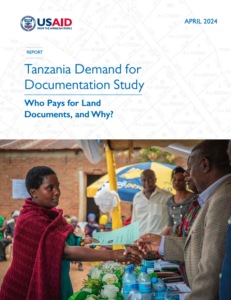 Despite strong evidence on the importance of land documentation for landholders’ tenure and economic security, among other benefits, national governments are often constrained in their ability to map and title property at scale. First-time land registration is often provided at no cost to the landholder but may be unsustainable for country governments and service providers. In the context of customary land systems, the beneficiary contribution models ask landholders to contribute some portion of the registration costs to obtain official documentation of land rights, but the approach could have implications for documentation access and equity.
Despite strong evidence on the importance of land documentation for landholders’ tenure and economic security, among other benefits, national governments are often constrained in their ability to map and title property at scale. First-time land registration is often provided at no cost to the landholder but may be unsustainable for country governments and service providers. In the context of customary land systems, the beneficiary contribution models ask landholders to contribute some portion of the registration costs to obtain official documentation of land rights, but the approach could have implications for documentation access and equity.
This study utilizes a mixed methods approach that draws on analysis of land registration data from a USAID-supported customary land formalization program in Tanzania, coupled with a follow-up household survey and qualitative data collection, to better understand rural Tanzanians’ willingness and ability to pay for government-issued and legally recognized customary land documents. The program operated in two phases, initially providing Certificates of Customary Right of Occupancy (CCROs) to landholders for free, and then requiring landholders to pay a nominal fee to obtain the document.
The study results suggest that to increase equity and reduce barriers to widespread uptake, programs can consider: installment payments to overcome cash flow constraints; increasing access to bank agents and mobile money payment modalities; quality control to avoid unauthorized payment collection; and a strategy to identify the most vulnerable landholders for subsidized payment support.


